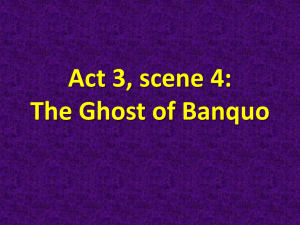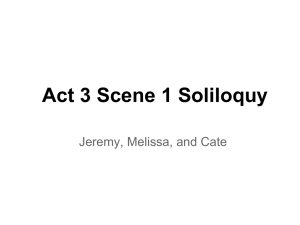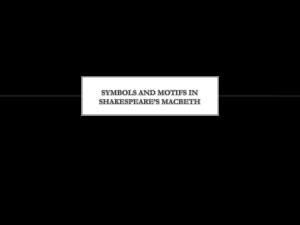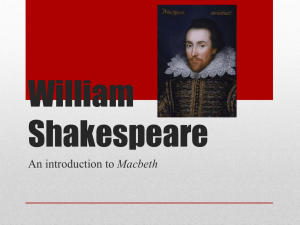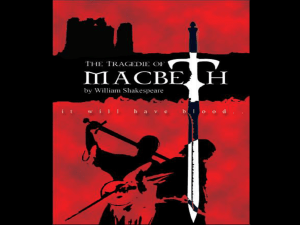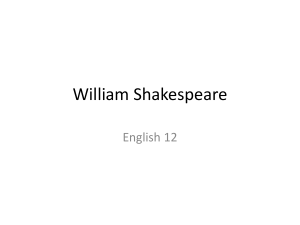Macbeth Soliloquy Act III Scene I
advertisement
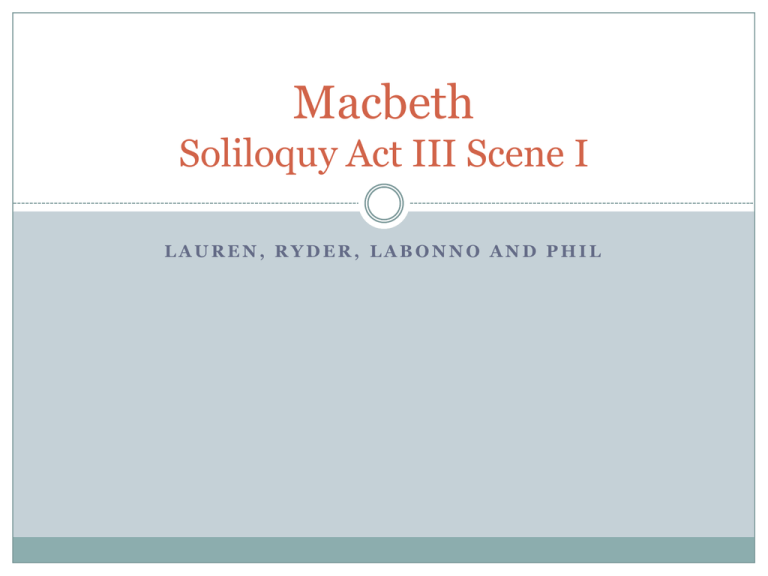
Macbeth Soliloquy Act III Scene I LAUREN, RYDER, LABONNO AND PHIL Context The soliloquy takes place at a feast in Macbeth’s castle. Banquo leaves the castle and promises to return for dinner. Due to his lack of children and the witches’ predictions, Macbeth is fearful that Banquo’s children will become the future kings of Scotland. He thus arranges to have Banquo killed upon his return to the castle. Section 1 To be thus is nothing, Macbeth’s paranoia becomes But to be safely thus. Our fears in visible in this portion of the soliloquy as he questions the safety of his crown. His royalty comes with consequences; fears for the security of his position Banquo Stick deep, and in his royalty of nature Reigns that which would be feared. ‘Tis much he dares, And to that dauntless temper of his mind He fears Banquo’s ‘royalty of nature’ Acknowledges that Banquo is a threat as his ‘fears in Banquo stick deep’ Section 2 He hath a wisdom that doth guide his valor To act in safety. There is none but he Whose being I do fear; and under him My genius is rebuked, as it is said Mark Antony’s was by Caesar. He chid the sisters And bade them speak to him. Then, prophet-like, They hailed him father to a line of kings It seems he only fears Banquo because of his capability to overthrow Macbeth Genius refers to a guardian spirit that according to Roman classical belief accompanied a spirit throughout life – Macbeth’s guardian spirit has left him leaving him seemingly unprotected Shakespeare alludes to another dramatic tragedy, Antony and Cleopatra which was written five years prior to Macbeth. “He chid the sisters” --> Banquo asked the witches for his fate which Macbeth attempts to use in justifying his paranoia/fear Section 3 Upon my head they placed a fruitless crown And put a barren scepter in my grip, Thence to be wrenched with an unlineal hand, No son of mine succeeding. If’t be so, For Banquo’s issue have I filed my mind; For them the gracious Duncan have I murdered Slightly bitter tone here; feels resentment towards the witches and blames them for his “fruitless crown” The fact that Macbeth does not have children makes him regret the murder of Duncan as his actions have only a short term success for his lineage, thus paving the way for Banquo’s descendants Also shows how Macbeth is envious/jealous because unlike Banquo, Macbeth does not have children. Section 4 Put rancors in the vessel of my peace Only for them, and mine eternal jewel Given to the common enemy of man “rancors” = bitter feelings; shows that Macbeth does feel guilty about murdering Duncan and realizes that he will never be at ‘peace’ with his newfound royalty; also highlights his paranoia “eternal jewel” refers to Macbeth’s soul and “the common enemy of man” refers to the devil; shows that Macbeth still understands that his previous actions were wrong Upset that he supposedly gave up his precious soul for Banquo’s children Section 5 To make the kings, the seeds of Banquo kings. Rather than so, come fate into the list, And champion me to th’ utterance. –Who’s there? Challenges fate despite the fact that he fully accepted the witches’ prophecies before Once again, decides to act on the given prophecy instead of allowing it to play out; before, he killed Duncan to become king & now he will kill Banquo in order to secure his position Contribution to the Theme This soliloquy begins to reveal the consequences of Macbeth’s murder of Duncan and the outcome it may have on Macbeth’s fate. In this soliloquy the reader sees Macbeth realizing how he essentially has paved the way for Banquo’s children. Macbeth’s reign is only temporary yet Banquo will have several sons reign as king of Scotland. Macbeth’s initial acts of violence continue as there will always be a threat to his crown thus, the violence due to his ambition to remain king, continues.

